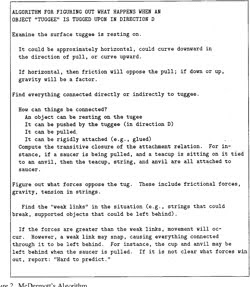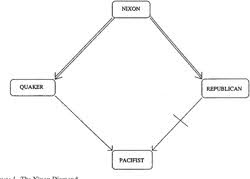John McCarthy and Patrick Hayes discovered the frame problem in 1969.
The problem concerns representing the effects of actions in
logic-based artificial intelligence.
Formal logic is used to define facts about the world, such
as a car can be started when the key is placed in the ignition and turned and
that pressing the accelerator causes it to move forward.
However, the latter fact does not explicitly state that the
car remains on after pressing the accelerator.
To correct this, the fact must be expanded to “pressing the
accelerator moves the car forward and does not turn it off.” However, this fact
must be augmented further to describe many other scenarios (e.g., that the
driver also remains in the vehicle) (e.g., that the driver also remains in the
vehicle).
The frame problem highlights an issue in logic involving the
construction of facts that do not require enumerating thousands of trivial
effects.
After its discovery by artificial intelligence researchers,
the frame issue was taken up by philosophers.
Their version of the issue could be appropriately dubbed the
world update problem since it involves updating frames of reference.
For example, how do you know your dog (or other pet) is
where you last saw them without seeing them again? In a philosophic perspective,
the frame issue is concerned with how well a person's perception of their
environment corresponds to reality and when that understanding should be
changed.
As intelligent agents plan activities in more complicated
environments, they will have to deal with this issue.
To solve the logic version of the frame problem, a number of
solutions have been proposed.
The philosophical problem, on the other hand, remains
unsolved.
Both must be solved in order for artificial intelligence to
behave intelligently.
You may also want to read more about Artificial Intelligence here.
See also:
Further Reading:
McCarthy, John, and Patrick J. Hayes. 1969. “Some Philosophical Problems from the Standpoint of Artificial Intelligence.” In Machine Intelligence, vol. 4, edited by Donald Michie and Bernard Meltzer, 463–502. Edinburgh, UK: Edinburgh University Press.
Shanahan, Murray. 1997. Solving the Frame Problem: A Mathematical Investigation of the Common Sense Law of Inertia. Cambridge, MA: MIT Press.
Shanahan, Murray. 2016. “The Frame Problem.” In The Stanford Encyclopedia of Philosophy, edited by Edward N. Zalta. https://plato.stanford.edu/entries/frame-problem.







